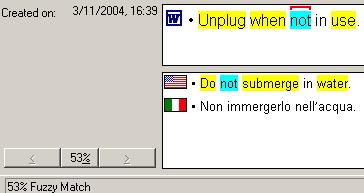Jobs for translators
Staff-translator
Good place to start
- Acquires skills while mentored by more experienced colleagues
- May accrue considerable experience in one (or more) specialistic
fields - At the beginning of one's career, better pay, and better benefits
Needs to be a team player
- Work well with other people
- Able to compromise
- Realize the end product is the team's translation, not an
individual one
Danger of growing stale
(Not several years of experience, but one year of experience several times over - which is true of other professions, of course)
Free-lance translator
More experience needed
(although many translators start here, with no experience), and needs to be a self-starter
Customers
Translation agencies
- Wide range of different companies, from concerns where only a very few people work (or even just the principal), through large international companies like SDL or Lionbridge
- Some companies try to be everything for every customer, other specialize in many different ways
- Example: our company specializes in providing higher quality services to other translation companies
See pages 28-30 of "How To Succeed as A Freelance translator"
Direct customers
- Private individuals (certificates, other documents, usually for consular or similar purposes)
- Businesses
- Software companies
- Law offices
- Manufacturing companies
- Etc.
- Software companies
- Public administration
- Court system
- Federal authorities (e.g., Department of State)
See page 31 of "How To Succeed as A Freelance translator" - Court system
Translation rates
How to set one's rates
Various ways of setting one's rates- Know what one's overhead is
- Determine what income one desires
- See what the market will bear
- Higher rates for more specialized work
- Higher rates for higher-quality work (but not everybody really wants that)
Useful links and material about translation rates
- Translators Café.com Rate Statistics
- Rates on individual translators' pages on ProZ.com
- Simon Turner's Tariffometro (useful, but in Italian)
Translation editor
- Task often given to inexperienced translators, should instead be reserved for experienced ones
- Not every good translator has the skills or mindset for translation editing
Translation project manager
- Organization
- Contacts with customers
- Contacts with vendors
- Work may be very different in different organizations
Looking for a job as translator
- Résumé
See my article on "How Not To Get Hired" - Marketing
- Tests
- Professionalism
- Meeting deadlines
- Not accepting work one is not qualified for
- Good communications with customer: Communicate issues as soon as they arise
- Meeting deadlines
- Other useful articles from ProZ.com
- Other useful articles from About Translation blog
Translation associations, communities and resources
Translation associations
- Local organizations
- Other national and international organizations
- FIT
Organization of translation association - Organizations in the various foreign countries
- AITI (Italy)
- etc.
- AITI (Italy)
- FIT
Translation communities
- Translation portals
- Other translators' online communities
- Translators' blogs
- About Translation (My own blog devoted to
professional translation) - Many other blogs
- About Translation (My own blog devoted to
Payment practice lists
(sites and lists where translators can check on the reputation and payment practices of translation companies)- ProZ's Blue Board
- TCR
- PP
- Other lists
Translation work
Work management
- Marketing
- Time management
- Project management
- Recording projects
- Doing the work
- Delivery
- Software for project management
- Translation Office 3000
- Ad-hoc software
- Translation Office 3000
- Recording projects
- Accounting
- Receiving orders
- Purchase orders
- Contracts
- Other systems (both more informal or formal)
- Purchase orders
- Invoicing
- Payment reminders
- Payment collection
- Receiving orders
Translation workflow
- SL writing
- Translation
- Editing
- Proofing
- QA
Assignments for next class
- Assignment: find a text that you'll translate as part of your Test for
Class 3 (max 250 words).- Select business or technical article to translate (will be translated after 3rd class)
- Indicate list of reference materials you intend to use to translate the text
- Write down what difficulties you expect to encounter in translating this materials
- Have this material ready before 3rd class, but do NOT yet translate the text
- Select business or technical article to translate (will be translated after 3rd class)
- Assignment: read chapter in "Becoming a Translator" about Learning
Notes from the previous lessons in this course:
Foundations of Translation - Course Description
Foundations of Translation - Lesson 1: Difference between translation and interpreting

